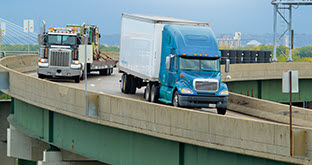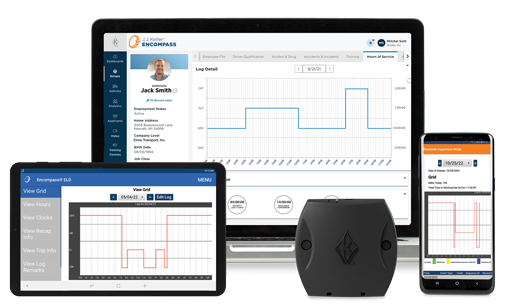Sr. Transportation Safety Editor — J. J. Keller & Associates, Inc.
Intrastate ELD Adoption and What You Need to Know
Knowing the difference between interstate and intrastate transportation is vital.
Published On: 08/01/2020


Written by:
Jill Schultz
This article was originally published on 4/1/2020 and was updated on 8/1/2020.
Knowing the difference between interstate and intrastate transportation is vital. Not having a solid understanding can put a motor carrier out of compliance, resulting in potential fines and penalties for both the motor carrier and driver.
The Complexity of Interstate & Intrastate Definitions
The Federal Motor Carrier Safety Administration (FMCSA) defines interstate commerce in Section 390.5 of the Federal Motor Carrier Safety Regulations (FMCSRs) as trade, traffic, or transportation in the United States:
- Between a place in a State and a place outside of such State (including a place outside of the United States);
- Between two places in a State through another State or a place outside of the United States; or
- Between two places in a State as part of trade, traffic, or transportation originating or terminating outside the State or the United States.
So, who exactly does this apply to, and when does it apply? This definition applies to drivers and vehicles that:
- Cross state lines;
- Travel over the border into and/or from Canada or Mexico; and
- Travel between two places within the same state, but the cargo/passengers are part of a trip that began or will end in another state or foreign country.
When it comes to understanding the term interstate commerce, the first two items listed above are pretty easy to understand. If you cross a border (either to another state or another country), you are considered to be in interstate commerce. The last item listed is a bit more difficult to understand. What is meant by “travel between two places within the same state, but the cargo is part of a trip that began or will end in another state or foreign country?”
The following are examples of what could be perceived as intrastate commerce but are actually interstate commerce.
- Joe picks up a load at the Los Angeles port. He then delivers this load to a warehouse seven miles down the road. Though Joe and his vehicle never crossed a state line, the cargo originated in another country (in this case China). Because the cargo originated in another country, this is considered interstate commerce.
- Sandy operates in Texas. She is based in Houston. She delivers goods from a warehouse in Houston to a receiver in Dallas. The goods she delivers from the Houston warehouse originate in Oklahoma City. Though Sandy never crosses the state line, the goods she is delivering to the receiver in Dallas originated in another state (Oklahoma). Because the intent of the shipment is interstate, she is involved in interstate commerce.
The FMCSA defines intrastate commerce in Section 390.5 of the FMCSRs as any trade, traffic, or transportation in any State which is not described in the term “interstate commerce.”
Intrastate commerce includes drivers and vehicles that remain exclusively within a state. Travel does not include crossing state lines, travel over the border into and/or from Canada or Mexico or transporting cargo/passengers that originated or are destined for another state or country. One of the common (and in most cases incorrect) assumptions is that an intrastate driver and vehicle are not subject to compliance with the FMCSRs. This is not necessarily true. The motor carrier needs to make sure compliance with the state’s intrastate requirements is understood and followed by all involved.
Electing to have certain drivers and vehicles follow a state’s intrastate requirements is a business decision. A motor carrier needs to weigh the pros — including the potential for compliance with fewer of the FMCSRs, with the cons — including having to follow and comply with more than one set of regulations.
You may also enjoy the following articles:
Sign up for our newsletter!
We'll help you stay on top of regulations, best practices, and fleet industry news. Sign up to receive a monthly email notification with links to our most recent blog articles, free resources, and event invites.
